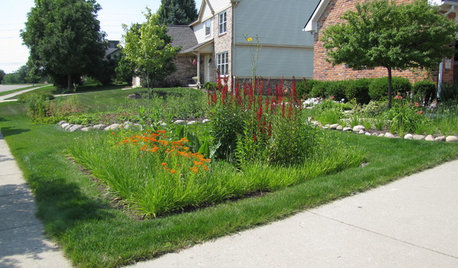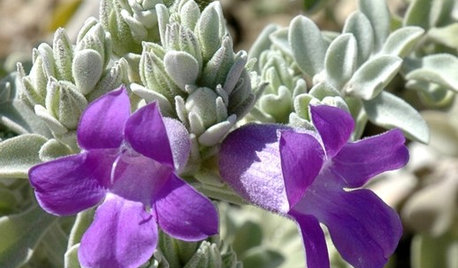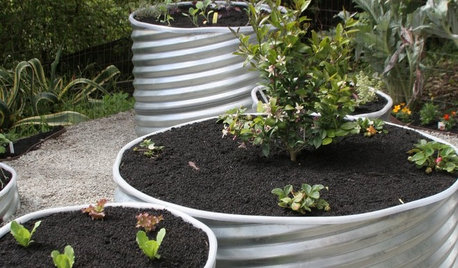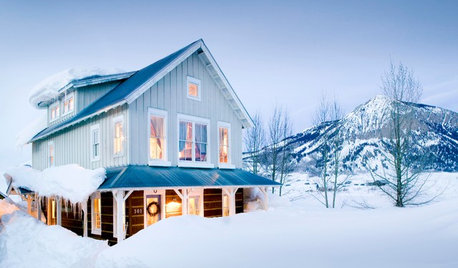Soil PH and Hard Water
elkwc
14 years ago
Featured Answer
Sort by:Oldest
Comments (10)
elkwc
14 years agolast modified: 9 years agoRelated Discussions
High pH, water hardness, and temperature
Comments (21)You can do much more harm than good by messing with ph/hardness. Changes are worse than constant high ph. Plenty of ponders are successful with readings like that. I'm going to assume you are in Southern CA where those type readings and temperatures are to be expected. If you are in Southern CA, there are a bunch of ponders in that area with loads of experience and extra plants and maybe extra fish that are members of the American Ponders forum. Having fish die in a brand new pond is common. You should add plants and let your pond cycle before adding any more fish....See MoreSoil pH vs Water pH
Comments (16)The closest large seller of farm fertilizer is about 50 mi south of here, but I can arrange a stop there on my way to getting pastured meat in the Fall. There used to be one not 15 miles from here but no more. As some of you know, my pH=9.2 water coupled with pH=7.7 soil can be a handful. Only grapes need it in the orchard, and I give it to tomatoes and potatoes in the garden, and of course I add more organic matter than most (21% OM in the garden). Anyhow, IIRC in late 2011 one 50lb bag of sulfur was $20. I had to sign a declaration that it and the rest of the stuff was intended for food production not to pay the sales tax. If you have relatively large holdings, it pays to go to such a place. A single 50 lbs urea bag allows many years of fertilization between trips. The 2011 trip was concomitant to starting the orchard in horrible, lifeless, compacted P=7ppm soil, so I got 25lbs of superP, 100 lbs of sulfur, microminerals solution to be added in the sprayer, and 50lbs of urea which will take me to 2020 or so. I have now added over 30 tons of wood chips to the orchard, and the soil is less horrible, but to start it you have to do a first amending....See MoreOptimal pH for black spot and pH of Scott's top soil
Comments (5)Malcolm: thanks for the info. on pH meter. I checked on that before, and found that most of them are not accurate, and even the more expensive one above $200 need to be re-calibrated before each use. Red cabbage boiled in distilled water is quite accurate, since I am testing one agent against each other: color of Miracle-Gro potting soil is very pink, against the color of Scott's premium top soil with peat moss (greenish blue). I checked the colors of all 10 samples after 1 hour: peat moss gets even pinker, Scott's premium soil gets greener. Reg_pnw7: thank you for your feed back, my goal is to learn, and I don't need to be right, since I'm a newbie. Corn meal tested neutral, and the color of red cabbage boiled in my alkaline tap water is bluish purple, compared to the color of red cabbage boiled in distilled water, pinkish purple. If you google "optimal pH for fungi growth", there are several that cited preferably acidic for fungi growth. The red cabbage boiled in distilled water is an interesting experiment to test various materials. Try it and you'll see how accurate it is by testing with at least 10 mediums: few drops of vinegar, coffee ground, peat moss, baking soda, MiracleGro potting soil versus Scott's bagged top soil. The peat moss and MiracleGro potting soil get more pink after several hours, and the Scott's get more green. I used quite accurate fish tank litmus paper (Jungle brand from Walmart). It correctly gave a 7 for distilled water, and a 8 for my tap water. The direction said to read within the first minute - it took more than 10 minutes to get the epsom salt to dissolve, and this gave a more alkaline false reading at pH 7.3 to 7.5. However, when epsom salt is tetsted with red cabbage, this gave a correct neutral pH: the color did not changed compared with the control red cabbage boiled in distilled water. Blackspots can germinate on the ground and get splashed up by rain water. This year I have zero blackspots on 10 Austin roses mulched with very alkaline horse manure, as recommended by the British....See MoreWater tester for soil ph?
Comments (3)I test my own soil all the time. Use distilled water and don't worry too much about the proportion of soil to water since pH is a logrithmic value. The only thing is that the experts suggest you run a buffered pH test to tell you precisely how much lime to add. I suggest you play with figures,; don't add more than 3,000 lb/acre lime/yr. and check pH the following year. To be on safe side use a mix of calcitic and dolomitic(High Magnesium)limestones....See MoreOkiedawn OK Zone 7
14 years agolast modified: 9 years agosoonergrandmom
14 years agolast modified: 9 years agoelkwc
14 years agolast modified: 9 years agop_mac
14 years agolast modified: 9 years agosoonergrandmom
14 years agolast modified: 9 years agomulberryknob
14 years agolast modified: 9 years agothesnowbishop
14 years agolast modified: 9 years agoelkwc
14 years agolast modified: 9 years ago
Related Stories

GARDENING GUIDESGrow a Beautiful Garden in Alkaline Soil
Got alkaline soil? Learn how to manage it and the many beautiful plants that will thrive in this ‘sweet’ soil
Full Story
GARDENING GUIDESGardening Solutions for Heavy Clay Soils
What’s a gardener to do with soil that’s easily compacted and has poor drainage? Find out here
Full Story
GARDENING GUIDESHow to Stop Worrying and Start Loving Clay Soil
Clay has many more benefits than you might imagine
Full Story
FARM YOUR YARDHow to Get Good Soil for Your Edible Garden
The nutrients in your soil feed the plants that feed you. Here are tips on getting it right — just in time for planting season
Full Story
LANDSCAPE DESIGNHow to Shape a Rain Garden and Create the Right Soil for It
Learn how to grade, lay out and amend the soil in your rain garden to support your plants
Full Story
GARDENING GUIDESGreat Design Plant: Try Blue Bells for Blooms in Dry Soil
This shrub’s violet-blue flowers and silvery foliage brighten low-water gardens all year long
Full Story
GARDENING GUIDESGet the Dirt on Your Garden’s Soil
Understand how your soil supports your plants so you can ensure your garden’s success
Full Story
GARDENING GUIDESHow to Pick a Mulch — and Why Your Soil Wants It
There's more to topdressing than shredded wood. Learn about mulch types, costs and design considerations here
Full Story
CONTAINER GARDENSContainer Gardening Basics: The Dirt on Soil
Learn the types of potting soil available and the best mixes to help your containers thrive
Full Story
LIFEHard Winter? 9 Ways to Battle Cabin Fever
We know a lot of you are trapped where it just won’t stop snowing. Here are some ways to survive
Full Story


mulberryknob